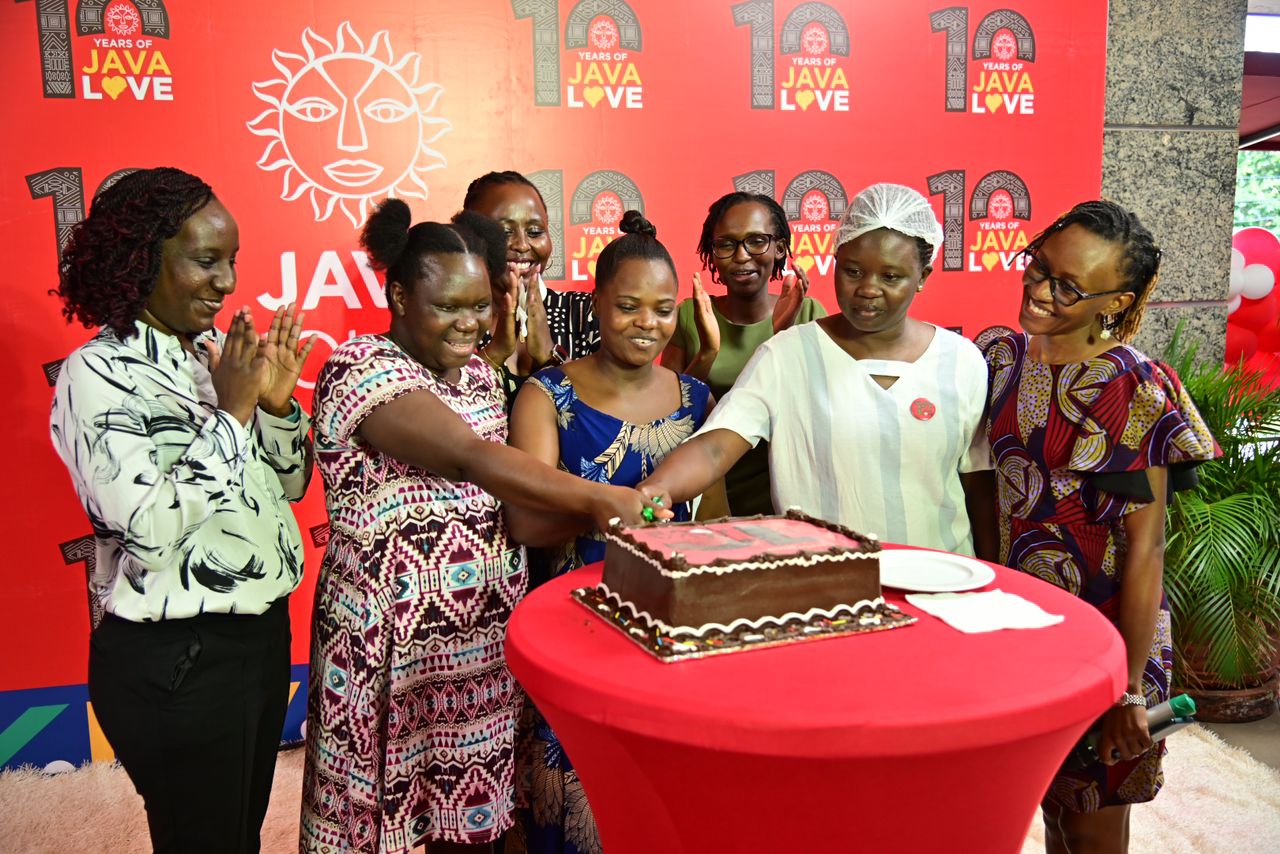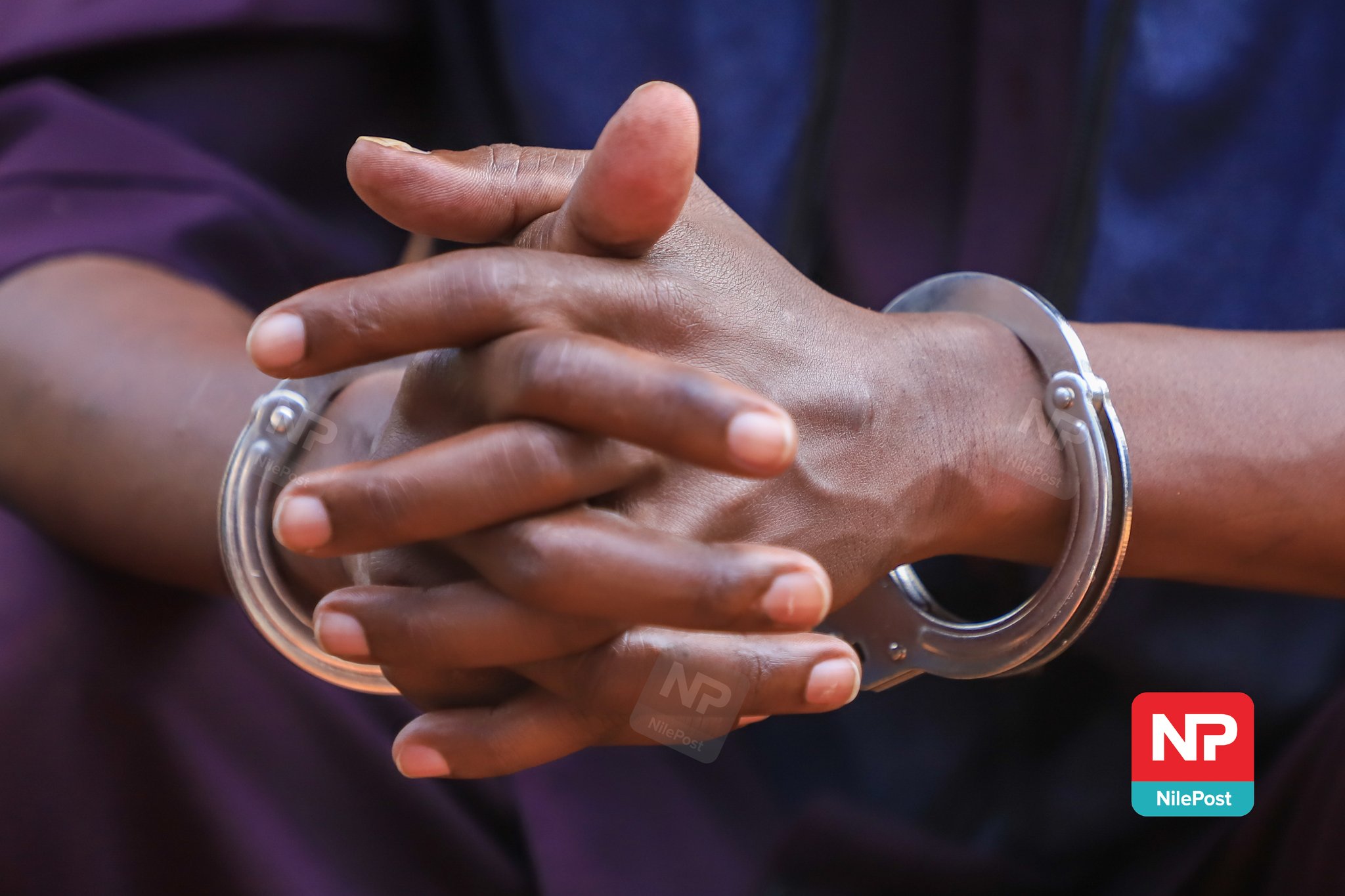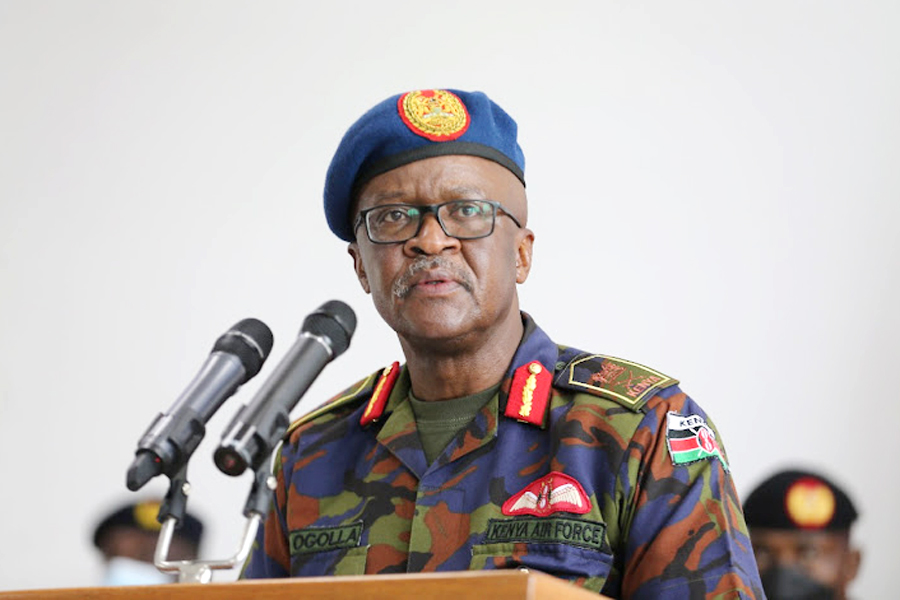Why are more single African women turning to love coaches?
The love-coaching industry is growing every year, thanks partly to rising number of thirtysomething women in search of a partner. Coaches often promise they'll ensure clients find a man, when there can never be any guarantee - but sometimes it seems they do succeed in making single people happier.
"I wanna tell you some of the mistakes you make," Robert Burale booms as he jumps across the stage, to pulsing music played by a DJ.
"Are you ready for this?" He asks the room.
There are muted embarrassed murmurs.
"ARE YOU READY FOR THIS?"
"YES!"
Then Robert, who has been moving constantly throughout his speech, suddenly comes to an abrupt halt in the centre of the stage, microphone in one hand, his other free to point at the audience.
"You ladies make a mistake by giving a man husband privileges at the boyfriend stage," he yells.
"Men are hunters! The moment a lion captures your neck and you bleed to death - he starts looking for another prey."
"So please. No ringy..." he flexes his hips "... no thingy."
The women laugh, nodding. Some clap.
Robert Burale is a love coach, and this event - called Dear Woman - is targeted at single women hoping to settle down, to find a husband.
A few days earlier he had greeted us with fist bumps outside his office in Nairobi, Kenya. It was way too hot for his pebble-grey suit with pink shirt, polka-dot tie and matching pocket handkerchief, but as he explained, you never know where the day will take you or who you'll meet. And you'll always make a good impression in a suit.
Inside the office, his coaching videos played on loops on several screens, and the scent of expensive aftershave followed him around as he gave us the tour. About a dozen people typed on computers; a young receptionist said that watching his videos saved her life.
A table was piled with the 46-year-old's self-help books. He's also written an autobiography called From the Strip Club to the Pulpit, which traces his unlikely path from pornography addiction to renown as one of the most sought-after motivational speakers at churches and conferences across Africa.
Robert says he has the secret to finding everlasting love - even though his own personal life hasn't always gone well.
"Full disclosure, my own marriage broke down very publicly," he says. "But that means I can fully advise women on how to have a successful relationship. I know where people go wrong."
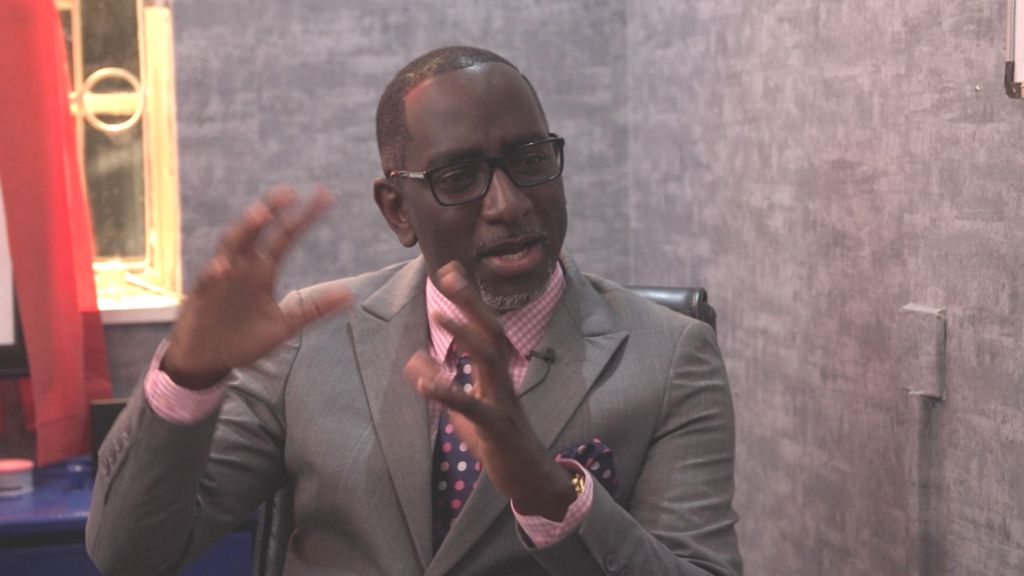
According to the International Coaching Federation - a global industry body - the personal development coaching business has doubled in numbers and value since 2015, a boom fuelled by an ever-expanding online audience, as well by demographic changes.
Personal development includes lifestyle coaching - which may include meditation, stress management and confidence growth - as well as love coaching, which is more about dating. But even with lifestyle coaching finding a partner may be the ultimate goal.
"There are two big factors driving the rising demand," says dating finance expert Jon Birger, the author of Make Your Move. "The first is the university gender gap — the shortage of men attending and graduating university. The other is the toxic culture of online dating. Both of these trends make dating exceedingly difficult for educated, successful, never-married women in their 30s and 40s. Unsurprisingly, this is the target market for most love coaches."
The UK's Office of National Statistics reported last year that the number of British women in their 30s who had never been married had doubled in a decade. Though the numbers may not always be so stark, something similar has been going on in countries from the US to Kenya.
One-on-one coaching with dating experts can cost up to $8,000 a month according to Jon Birger, while the International Coaching Federation says the worldwide personal development coaching industry is now worth about $13bn per year.

The day before the Dear Woman event Mary's neighbours are giving their six-day-old baby girl a bath in a plastic tub on the porch - cooing to the infant who squints back confusedly. Mary smiles over at them. She'd like a baby.
Mary is 35 and unmarried, in a country where the average age for marriage is 21 in cities, and and 19 in rural areas, according to the World Bank. Three of her five younger sisters have already married.
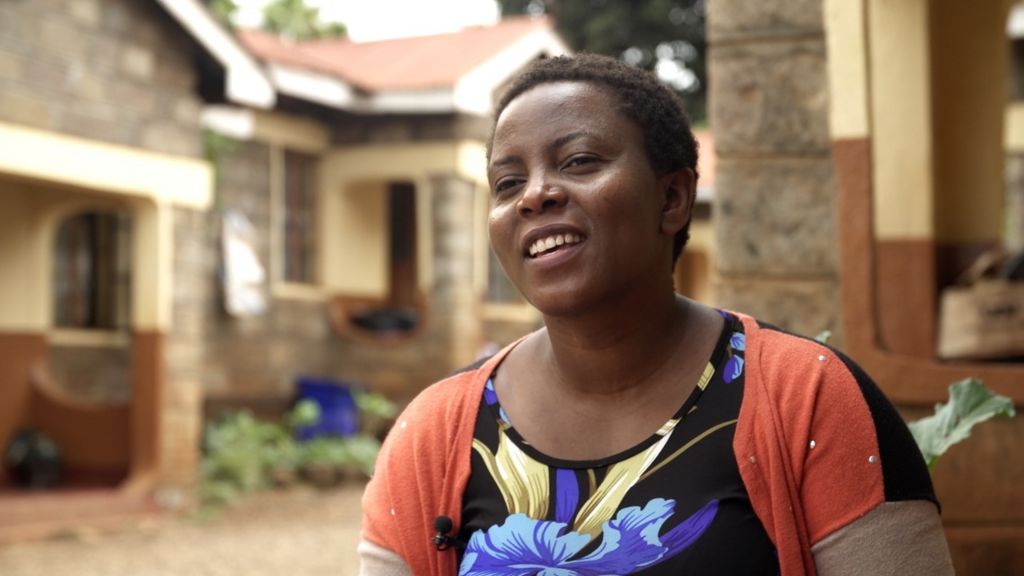
"Most pressure comes from your family, your parents, your grandparents, your uncles, aunts," she says. They ask her constantly why she's single. "I want to know, what am I doing wrong," Mary says.
But does the fact that she is single really mean that she is doing something wrong, we ask. Couldn't there be other factors? Or could it be that meeting the right person is a matter of chance?
"I don't know. A lot of people tell me I'm choosy. I don't know if I'm choosy or not. I don't know," she says.
Mary works in a call centre, and Robert Burale's Dear Woman course will cost $50, a week's salary.
She's not sure it will work - whether the investment will bag her a husband - but she's up for it anyway.
"It's worth a try, I would say."

Matthew Hussey is a global coaching star, author of the New York Times bestseller Get the Guy. A video on his YouTube channel (with 2.2 million subscribers) titled "3 Man Melting Phrases That Make a Guy Fall For You" has chalked up over 18 million hits.
An in-person booking at one of his lifestyle coaching retreats can cost several thousand dollars. Even a virtual retreat is $800.
We speak to one woman who says she is planning to pay for a forthcoming Matthew Hussey event in order to heal after a particularly bad break-up. So we put it to him that people may come to him at vulnerable stages of their life - and he sells them a dream.
"I don't believe that anyone can watch any of my videos and claim that I'm selling a dream," he says. "I'm very honest about what I think is possible. If someone comes to me for dating advice, I want to help them be happy whether it works or not - because it's not always going to work."
It's great when someone approaches him on the street and says they are married because of him, he says.
"If that's what you wanted, and that's what you got, that's amazing," he says. "But I also want to make sure that you're just as happy if you didn't find that."
There may be a message in this for Mary.
It's now the day of the Dear Woman event, staged at an exclusive marble-floored, chandelier-laden hotel owned by Kenya's vice-president - his daughter is a friend of Robert's.
Outside the conference room stands a giant glossy black banner of Robert Burale, chisel-jawed and highly groomed, with a tightly clipped beard and designer glasses. Inside, a dozen tables are covered in crisp white linen cloths. The chairs face a stage with a large velvet throne.
Usually Robert Burale hosts events in arenas and halls with hundreds of attendees, but Covid restrictions mean that this time only 30 women have been invited.
Mary waves and makes her way to the back of the room to find a chair.
The other attendees have come from all over Nairobi and beyond. One woman tells us that she travelled five hours on three buses to make it by 10am.
But they'll have to wait for Robert Burale as guest speakers lead the morning sessions. As Robert's friend, motivational coach and radio host Shazmeen Bank, talks about overcoming domestic violence in a relationship, several women start to cry. A 2014 survey by the Ministry of Health indicated that 45% of women and girls aged between 15 and 49 had experienced physical violence.
But the mood doesn't stay down long, a comedian has them laughing over dating mishaps, and an image consultant tells everyone to pull their shoulders back and sit up straight because "body language reflects confidence and everyone is attracted to confidence".
Then there's lunch, before the main attraction, the man they've all come to see, takes to the stage.
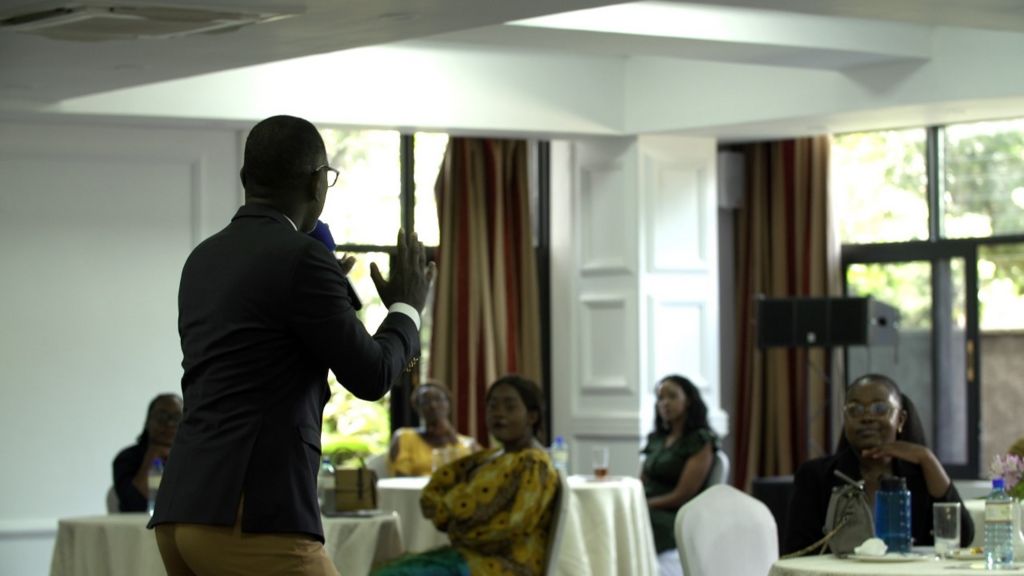
"This is a seminar to find a husband. If you listen, I can help you find a husband by Christmas," Robert Burale booms. "And if that's not what you want, please leave."
If anyone does want to leave, they are too embarrassed to do it.
"Today we will talk to you ladies on matters concerning relationships. Some of you may realise, you have been single - not because the men are not there - but you have been single because of your mistakes."
One of these mistakes, he tells his listeners, is having sex too quickly with men - and they are wearing clothes that are too short and tight. Mary, who had been making some notes throughout the day, puts down her pen and looks amused.
Robert runs through a fine-dining etiquette lesson, which resembles scenes from the film My Fair Lady stitched together. And then there's an energetic high-energy conga caterpillar line dance that Robert leads through the room, after which the women laugh heartily, defences down, as they return to their seats.
Robert says he will be choosing some women to come on stage to discuss how they have come to be single. Mary is one.
Why is she single, he asks.
There was a guy back home where she grew up, Mary replies.
"He was very hot. When I say hot, he was hot - six pack, good looking, everything." Mary laughs, looking out to an audience that readily joins in.
"We dated for about one-and-a-half years. Then he got a job in Nairobi. When he got a job in Nairobi, we communicated for at least three months. After that three months, communication went - poofff! Dead."
Mary was being ghosted by the man she thought she would marry.
"So when I called him to enquire what was happening, this guy told me you know what? 'My lifestyle has changed. My class has changed.'"
Mary pauses.
Robert picks up.
"He made you feel lower?"
"Very low," Mary replies. "That guy lowered my self-esteem to a point that sometimes…" she starts to cry.
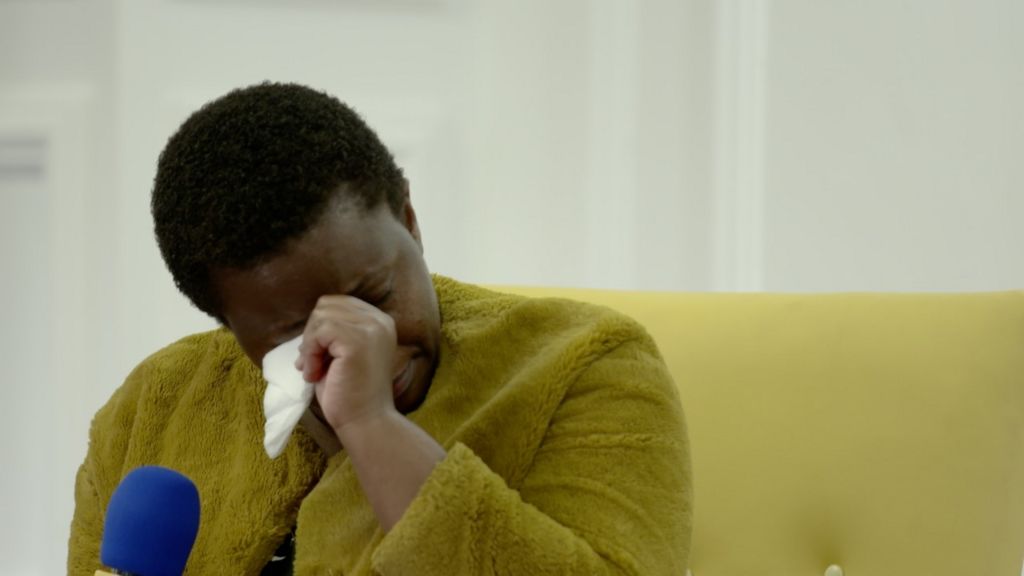
"It's hard," she says finally. "I felt like I was not enough."
She says she hasn't seriously dated since that relationship ended in 2012.
Robert starts talking again, this time his voice quieter, soothing. He tells her that it's not her fault, that even if it feels messy, she has to be open to love. It may sound obvious, just what your best friend would tell you after a break-up, but after a six-hour day of congas and comedians, Mary nods like it's the gospel itself.
As she makes her way back to her seat though, she smiles over to us, shaking her head slightly as if to say, "Where did all that come from?"
And very soon the day was over. The women embraced and some stopped to swap numbers, sisters in singledom.

The day after Dear Woman, Robert Burale is about to go on air with his weekly coaching show on a popular radio station when we drop by to see him.
He is wearing a dark designer tracksuit, printed with his initials and is visibly tired. The week has taken it out of him, he says. He needs a quiet day to himself after this broadcast.
Overall, he's happy with how the course went - he's had a lot of good feedback. We cannot help asking, though, whether he truly believes all the advice he's giving. Parts of it seem very dated. And does he really think these women are single because they made mistakes? Surely there could be many factors at play?
"It's what works," he replies. "Can you get a husband by being yourself and waiting for luck? Yes, of course you can. But I'm telling them what works in speeding up the process and to feel in control of their own lives."
And like Matthew Hussey, he says there is more to his coaching than the headline message about getting a man.
"People come to me, to a coach, thinking you want one thing and finding out that it's actually something else," he says.
Mary's about to meet a male friend - just a friend, she giggles - for dinner, so she says can't speak for long. She loved the seminar, she says. She learned a lot.
We ask her what she thinks about the advice to abstain from sex until you know a man is committed.
"I mean, that part felt a bit old-fashioned. I won't be listening to that," she says
Mary is wearing a burnt orange T-shirt that matches the golden hour of the sunset. It has bold print lettering on it which says, "Don't Panic."
Love, she says, can wait.
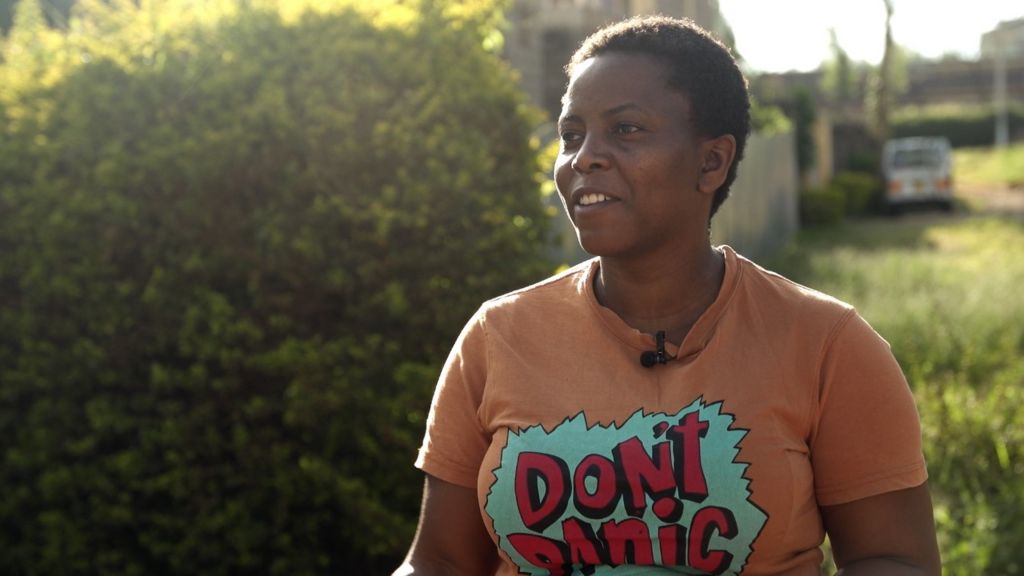
"The most important takeaway from that course was just be happy. Make yourself happy. Love yourself. Before you give love out there, give it to yourself fully!
"There's still time. There is still time. I'm still young. Ha!"
Five months later Mary remains single, but something seems to have changed - she's single, but happy.
Source: BBC


